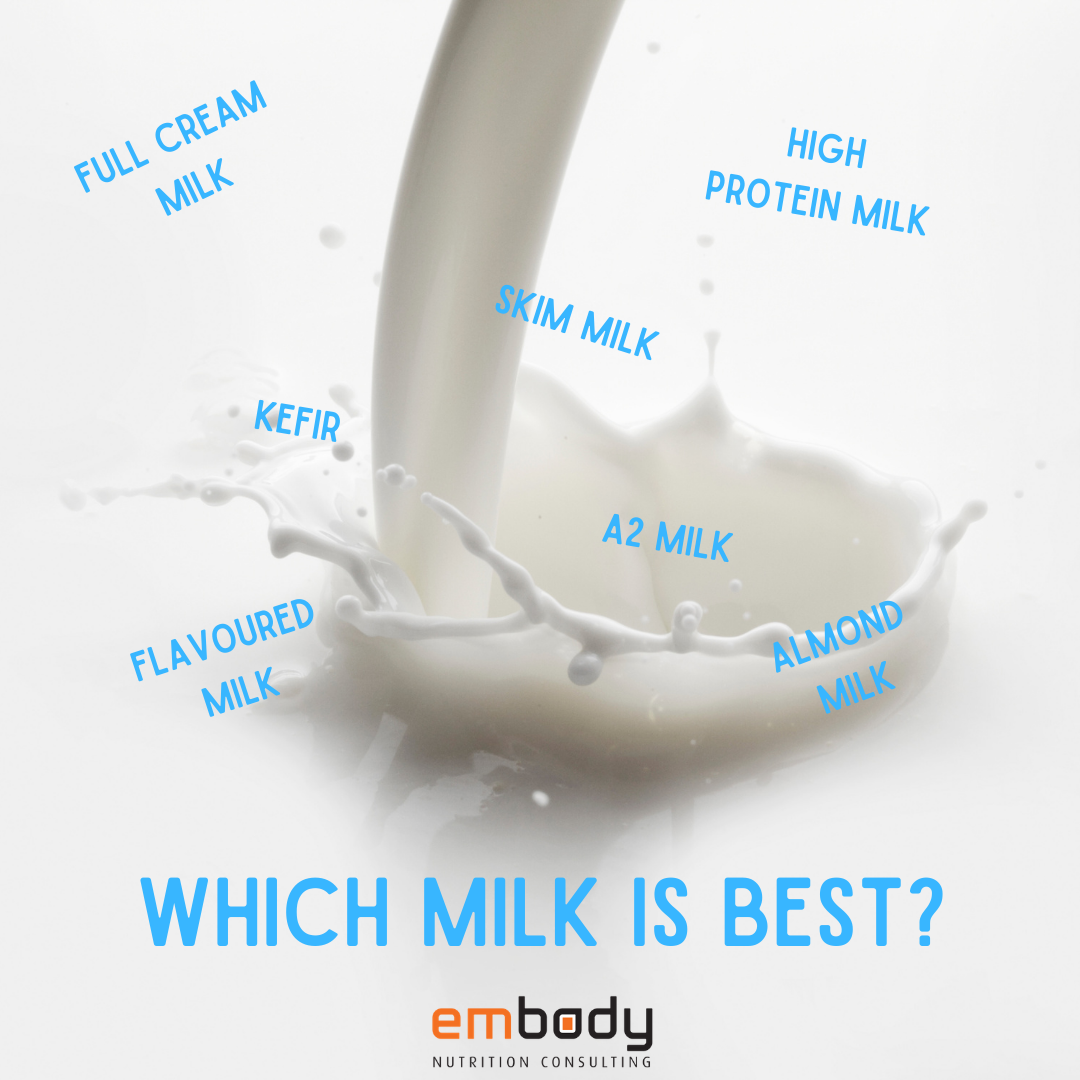The amount of milk products on the market today can be overwhelming to say the least. If you’re feeling a little lost on what milk is best, here is a review of some common products available, what’s in them and who they may be beneficial for.
Full Cream Milk
| Energy (kj) | 659 |
| Protein (g) | 8.5 |
| Fat (g) | 8.5 |
| Carbohydrate (g) | 12.0 |
| Calcium (mg) | 292 |
| Phosphorus (mg) | 222 |
| Potassium (mg) | 363 |
| Vitamin B12 (ug) | 1.1 |
Full Cream milk is a great source of calcium, phosphorus, potassium and vitamin b12. Excluding those who have intolerances or gastrointestinal distress, full cream milk is an appropriate product for people of all ages. Children especially will benefit as the calcium and protein in particular is beneficial for growth and development, while middle aged adults can prevent the onset of conditions such as osteoporosis. Elderly consumers can also use full cream milk to manage and minimise the effects of osteoporosis and brittle bones, minimising the likelihood of falls and breaks.
Skim Milk
| Energy (kj) | 375 |
| Protein (g) | 9.0 |
| Fat (g) | 0.3 |
| Carbohydrate (g) | 12.5 |
| Calcium (mg) | 295 |
| Phosphorus (mg) | 250 |
| Potassium (mg) | 382 |
| Vitamin B12 (ug) | 0.9 |
Skim milk provides similar benefits to full cream with a significant decrease in the fat content. This would be largely beneficial for those looking to reduce weight or mange their fat intake. Although commonly thought to have high amounts of added sugar, skim milk has a close to identical amount of sugar when compared to full cream milk.
High Protein Milk (eg. The Complete Dairy, Paul’s High Protein Milk)
| Energy (kj) | 710 |
| Protein (g) | 15.0 |
| Fat (g) | 8.5 |
| Carbohydrate (g) | 8.3 |
| Calcium (mg) | 430 |
| Phosphorus (mg) | NA |
| Potassium (mg) | NA |
| Vitamin B12 (ug) | NA |
High protein milk contains 15 grams of protein per serve and has a slightly larger energy content when compared to full cream milk. This product would be beneficial for elderly consumers who struggle to consume enough kilojoules, maintain weight and who require high levels of protein to prevent muscle wasting. Athletes who wish to increase muscle mass and size may also find this product useful due to its high protein content.Information on phosphorus, potassium and vitamin b12 content was unavailable on this product.
Almond Milk
| Energy (kj) | 168 |
| Protein (g) | 1.3 |
| Fat (g) | 3.0 |
| Carbohydrate (g) | 1.8 |
| Calcium (mg) | 200 |
| Phosphorus (mg) | 187 |
| Potassium (mg) | 49 |
| Vitamin B12 (ug) | 0.4 |
Almond milk is low in energy, macronutrients as well as vitamins and mineral. Although this product may provide relief to people who suffer lactose intolerance or experience GI discomfort when consuming milk, it does not provide the benefits associated with cow’s milk. This must be accounted for in other aspects of the diet. Children and the elderly should not be encouraged to use almond milk unless alternatives are not consumable. Those who suffer chronic kidney failure and chronic kidney disease may find this product beneficial due to the low potassium and protein content.
A2 Milk
| Energy (kj) | 688 |
| Protein (g) | 8.3 |
| Fat (g) | 8.8 |
| Carbohydrate (g) | 5.0 |
| Calcium (mg) | 273 |
| Phosphorus (mg) | 230 |
| Potassium (mg) | 368 |
| Vitamin B12 (ug) | 1.1 |
A2 milk has an extremely similar nutrient profile to full cream milk with less carbohydrates. This is because this form of milk has the A1 protein removed. The remaining milk remains unchanged. For some people drinking the A2 milk protein allows for greater toleration when compared to regular cow’s milk. As there is minimal change to the milk’s contents, this product is suitable for all groups.
Flavoured Milk (Chocolate)
| Energy (kj) | 940 |
| Protein (g) | 8.8 |
| Fat (g) | 8.5 |
| Carbohydrate (g) | 27.5 |
| Calcium (mg) | 288 |
| Phosphorus (mg) | 255 |
| Potassium (mg) | 417 |
| Vitamin B12 (ug) | 0.8 |
Flavoured milk contains a high amount of energy which comes from added sugars. Vitamin b12 is low when compared to full cream milk however potassium levels are high. Due to the high energy content of the product, it would not be suitable for those looking to lose wight, those who have potassium restrictions and should be consumed occasionally, not regularly. The elderly and groups who are ill may need to increase weight in which case this product would be suitable. Chocolate milk can also be a great recovery drink for athletes in some situations.
Kefir
| Energy (kj) | 390 |
| Protein (g) | 6.8 |
| Fat (g) | 3.6 |
| Carbohydrate (g) | 6.6 |
| Calcium (mg) | 222 |
| Phosphorus (mg) | 228 |
| Potassium (mg) | 372 |
| Vitamin B12 (ug) | 0.4 |
Kefir milk is similar to a thin yoghurt and is made from fermented grains. It contains less energy, protein, fat, carbohydrates, and vitamin b12 when compared to full cream milk. This product does however have adequate calcium content making it appropriate for most groups; especially those who suffer lactose intolerance. This is because, the fermentation process removes most if not all of the lactose from the milk.

